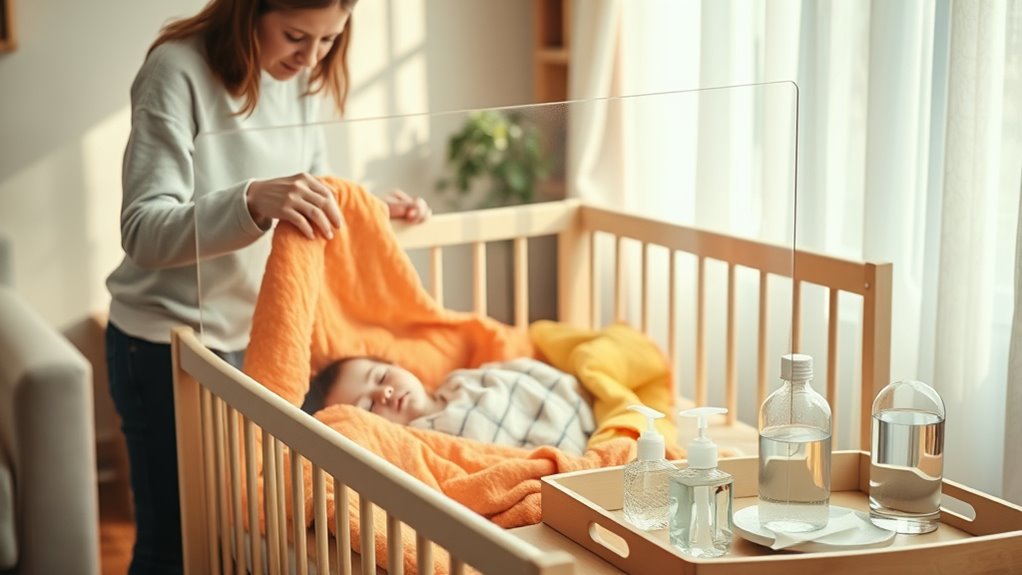To isolate a sick family member and protect your baby, set up a separate space for the sick person, ideally in a different room, and keep the baby elsewhere whenever possible. Practice strict hygiene by washing hands frequently, disinfecting surfaces daily, and having visitors follow hygiene protocols. Keep windows open for good ventilation and wear masks around the baby. Implement these steps consistently to create a safe environment—more tips to guarantee peace of mind await you.
Key Takeaways
- Designate a separate, well-ventilated room for the sick family member to rest and recover.
- Limit the sick person’s interaction with the baby and household areas as much as possible.
- Require the sick individual to wear a mask around others, especially near the baby, to reduce airborne transmission.
- Implement strict hygiene routines, including frequent handwashing and disinfecting shared surfaces and items daily.
- Restrict visitor access and establish a designated area for necessary visits, ensuring proper hygiene protocols are followed.

When you’re feeling under the weather, having a sick day plan can make recovery smoother and less stressful. One of the most important steps is to minimize the risk of spreading illness to your baby and other family members. Start by focusing on hygiene practices. Wash your hands frequently with soap and water for at least 20 seconds, especially before touching your baby or any shared items. Use hand sanitizer containing at least 60% alcohol if soap and water aren’t available. Cover your mouth and nose with a tissue or your elbow when coughing or sneezing, and dispose of tissues immediately. Clean and disinfect commonly touched surfaces daily, including doorknobs, light switches, and mobile devices, to prevent germs from lingering around the house.
Equally crucial is enforcing visitor restrictions. Limit visitors to only those essential for your care or support, and ensure they understand the importance of hygiene practices before entering your home. It’s best to keep friends, extended family, or anyone who might be sick away from your space until you’re fully recovered. This reduces the chance of transmitting germs to your vulnerable baby. Consider setting up a designated area for visitors to interact with your child, if necessary, and require everyone to wash their hands or use hand sanitizer upon entry. If visitors are not necessary, avoid having anyone come over until your illness has cleared and you’re confident you won’t pass along any germs.
Creating a separate space for your sick family member can further limit exposure. Use a different room for resting and caring for yourself, and keep your baby in a separate, clean environment whenever possible. Wearing a mask when you’re around your baby can also help prevent the spread of airborne germs. Keep your sick family member isolated from shared spaces as much as possible, and encourage everyone in the household to follow strict hygiene practices. Proper ventilation by opening windows or using air filters can help circulate clean air and reduce viral particles in the air.
Frequently Asked Questions
How Can I Prevent My Baby From Catching Illnesses From a Sick Family Member?
To prevent your baby from catching illnesses, you should follow proper hygiene practices like frequent handwashing and disinfecting surfaces. Make sure all family members stay up-to-date on vaccination schedules to reduce disease spread. Keep the sick person isolated in a separate room if possible, and encourage them to wear a mask. These steps help protect your baby’s health by minimizing exposure to germs and boosting immunity.
What Are the Best Ways to Disinfect Shared Household Items During Illness?
During illness, diligent disinfecting is key to keeping your home safe. You should regularly disinfect surfaces like doorknobs, countertops, and light switches with effective cleaners. Don’t forget laundry sanitation—wash bedding, towels, and clothing frequently in hot water. Using disinfectant sprays or wipes helps eliminate germs on shared household items. By combining consistent surface disinfection and thorough laundry sanitation, you create a clean, contamination-free environment that protects your family and especially your baby.
How Do I Manage Multiple Sick Family Members Simultaneously?
When managing multiple sick family members, you should focus on effective room setup and clear communication strategies. Assign separate spaces for each person to prevent cross-contamination, and keep shared areas well-ventilated. Use simple language to update everyone on needs and health status, ensuring everyone understands protocols. Staying organized and communicating openly helps reduce the spread of illness and keeps your household safer and more manageable during this challenging time.
When Should I Seek Medical Attention for a Sick Baby or Family Member?
Did you know that about 1 in 5 children under five visit the emergency room annually? You should seek medical attention if your baby shows severe symptoms like difficulty breathing, persistent high fever, or unresponsiveness. Trust your instincts—if symptoms worsen or alarm you, especially emergency signs, don’t hesitate to contact your healthcare provider immediately. Early intervention can prevent complications and make certain your loved ones get the care they need.
How Can I Support a Family Member’s Recovery Without Risking Others’ Health?
You can support a family member’s recovery by offering emotional support and comfort, which boosts their morale. Use home remedies like warm teas or humidifiers to ease symptoms. Make sure they rest in a separate, well-ventilated space to prevent spread. Regularly check on them, but wash your hands often and wear masks if needed. Your caring presence and practical help can make their recovery smoother without risking others’ health.
Conclusion
By following this sick day plan, you’ll create an impenetrable fortress of protection around your baby, so resilient even the mightiest germs stand no chance. Your commitment to isolation and cleanliness transforms your home into a fortress of health, a sanctuary where tiny lives are shielded from illness like an impenetrable bubble. With these steps, you’re not just caring—you’re wielding the ultimate defense, turning your home into an unstoppable citadel of safety and love.










